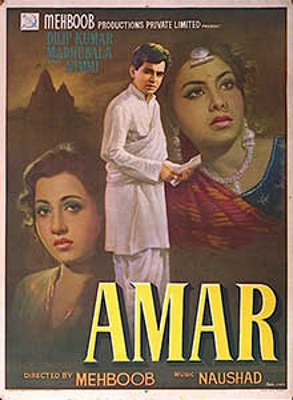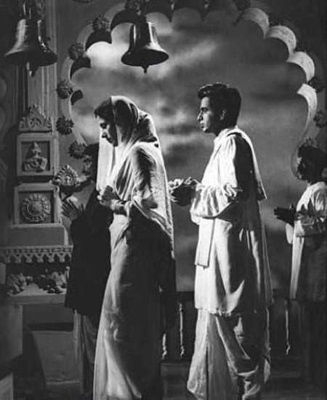This film from Mehboob Khan isn't as well-regarded
or as famous as his classic Bollywood film, Mother India, but it has moments
of such brilliance that they penetrated my brain like a surgical drill. Certain
scenes were constructed so well that I felt like holding my breath. A fuselage
of images edited together in a seamless hush. There is though no joy
to be found in this dark ominous fateful film. The whole thing weighs down
on you like the night air right before a monsoon rain. Four interwoven lives
wrecked through the abhorrent action of one "good" man whose guilt is destroying
him from within and is like an anvil above him just waiting to crash on his
head. But for a blown scarf in the wind, none of this would have happened.
But for a window being open life would have proceeded as planned.
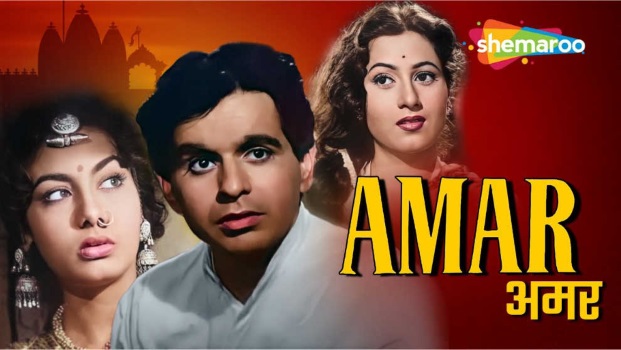
There is a long lead-up to a scene which the film revolves around. The village
belle Sonia (a remarkable Nimmi) is dancing at the fair. Around her are the
village people cheering her on including the village Brahmin, lawyer Amar
(Dilip Kumar) and the woman he has just fallen in love with Anju (Madhubala).
The dance ends and the rain comes in blankets. Amar and Anju go to their
separate homes and Sonia trudges through the mud back to her home but she
comes across the village "bully", Sankat (Jayant) who likes to say "What
good is a man who does not have a knife and a moustache". Sonia has
broken his heart and he wants revenge and they thrash through the pouring
rain as she dodges and hides from him. At one point she dives under water
to hold her breath and the camera shows him walking in the water, his footsteps
just missing her wide-open eyes. She gets out and makes a dash - right through
the blown open window of Amar's home. The only lights are the flashing of
lightening as first hears her and then sees her, huddled against the wall
- soaking wet, terror and desire in her eyes - fear, repulsion and desire
in his and then a burst of thunder. She is next seen making her way home
where her parents announce that she has to marry Sankat.
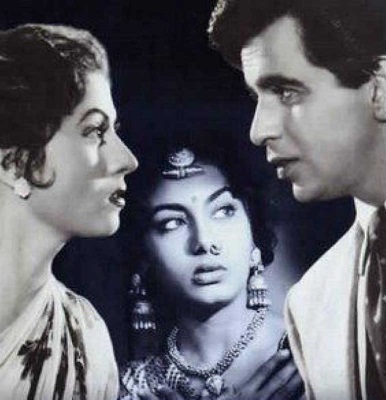
It is left up to our imagination as to what happened between the thunder
and her walking home, but clearly they had sex. Was it rape or consensual?
It doesn't matter in traditional India. It is against the rules of society.
You don't have sex before marriage if you are a woman. When the village finds
out, they want to gather and kill her. For him it is almost as bad - he is
engaged to a woman of equal status - to have sex with a woman far beneath
him and then try covering it up is shameful. the end of everything
he has built in his life. Amar wrestles with his conscious, wanting to tell
Anju but not having the courage to because he loves her madly and knows this
will destroy what they have. At one point he looks at a knife that Sankat
dropped in his house and then looks out at Sonia walking by and you know
what he is thinking. Everyone knows Sankat's knife.
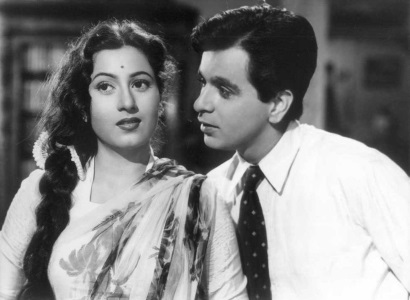
Shot beautifully in black and white, there are times with the remarkable
number of facial close-ups and emotional expressions that it feels like a
silent film. Even hinting at rape was extremely controversial at the time
and especially as played by Dilip Kumar. Indian cinema was ruled by three
male actors in the 1950s - Ashok Kumar, Raj Kapoor and Dilip Kumar. All three
were legendary. To modern eyes it is hard to tell exactly why I admit. But
for Kumar to play such a character was unheard of. He was always the Hero.
Here he is this upper-class lawyer who the villager's worship for his goodness
and kindness. Though he is always very aware of his position and status compared
to them. His love affair with Anju is what fairy tales are made of. She is
a progressive woman with a university education and a sense of civic duty
to others. He and Madhubala were in the middle of a decades long affair and
she was not yet the huge star that she would become.
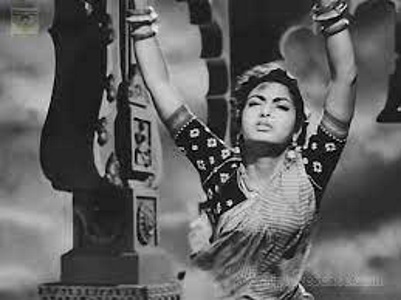
The film though belongs to Nimmi, the simple village lass who talks to animals
and loves to dance, refusing to marry a bully and wanting little in life
besides freedom to be who she wants to be. A little bit loony. She gets most
of the songs and dances and the emotional scenes. Khan the director seems
gobsmacked by both actresses - the lighting, the close-ups are an act of
love. There are some ten songs composed by Naushad and they are lovely
- traditional, slow, often mournful - and the lyrics by Shakeel are poetic.
the playback singers are the big three - Lata, Asha and Rafi. It is a film
that at times I felt like deserting because it made me so uncomfortable but
then another wonderful emotive artistically staged scene kept me going. 150
minutes.
